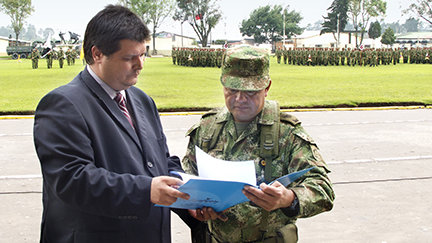CASE STUDY
BUILDING THE FOUNDATION FOR A
DRUG-FREE FUTURE
Colombia is not only a major cocaine pipeline for the world, but it also has a cocaine epidemic of its own. With hundreds of thousands of addicts and one of the highest rates in South America, the situation is at crisis proportions and the demand for solutions has never been higher.

In reply, Narconon expanded by opening new and larger premises on two acres, naming it Terranova—New Land. The program is open to anyone from any part of society, whether a university student, young professional or former dealer. Its unparalleled success rate has resulted in two dozen Colombian cities referring addicts to Narconon.
Narconon Colombia in Bogotá has long provided drug rehabilitation services, its facility filled to capacity by addicts from the cartel-controlled cocaine slum El Cartucho. At the request of desperate families, Narconon began running rescue missions into El Cartucho to literally pull young people from the clutches of drug dealers. When their operation made headlines, public outrage resulted in the government shutting down El Cartucho.

In recognition of education as the ultimate solution to stemming addiction, Narconon Colombia launched a national hand-to-hand distribution of drug prevention literature. A Narconon team also conducted dozens of drug education lectures in schools across the country, reaching 93 cities in 15 states.
To provide drug-prevention tools to law enforcement personnel who daily deal with the problem of drug addiction in the community, Narconon has delivered workshops and materials to national police officers in Bogotá, an Anti-Narcotic Special Force and the Kennedy Police Department. They have also placed educational materials with other sectors of law enforcement including the Vigilance Police, the Highway Patrol and the Counter Guerrilla Forces, reaching 20,000 police personnel in the country.
Narconon education, prevention and rehabilitation actions have contributed substantially to turning the tide on Colombia’s cocaine epidemic, with the United Nations reporting that Colombian drug usage has dropped 50 percent nationwide.





















